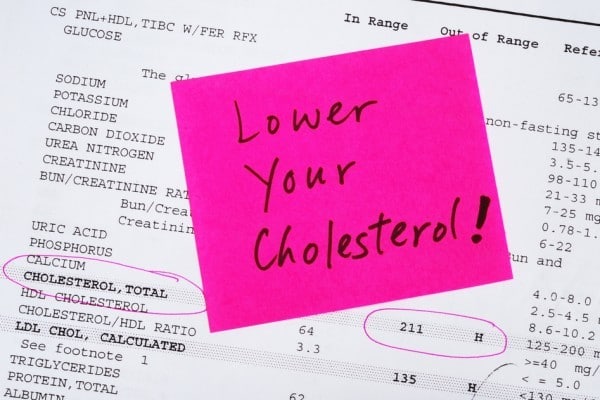Is Cholesterol Really Killing Us?
We are led to believe that our cholesterol levels are directly linked to cardiovascular disease. We are told that if we can get the total cholesterol under 200, or the low-density lipoprotein (LDL – “bad cholesterol”) under 100, that this will protect us.
Even WebMD, tells us:
“When there is too much cholesterol in your blood, it builds up in the walls of your arteries, causing a process called atherosclerosis, a form of heart disease. The arteries become narrowed and blood flow to the heart muscle is slowed down or blocked.”
So of course we’re afraid when our doctor tell us that our cholesterol is high. We don’t want cholesterol to build up in the walls of our arteries!
Often, doctors will look at the ratio of our total cholesterol to our good cholesterol. If the ratio is good (less than 4:1), we’re told not to worry – the good (HDL) cholesterol will protect us.
Well, what about those of us who don’t have a good ratio and have “terrible” cholesterol? Are we doomed?
Many patients come to me with cholesterol profiles considered by traditional standards to be terrible. Many of the people have tried statins (medication that blocks cholesterol) and couldn’t tolerate the side effects, so they stopped.
Side effects of statins may include:
- Myopathy
- Damage to muscle tissue, which can cause mild to severe pain. This can cause a lot of fatigue. People who do very strenuous exercise need to stay very hydrated if on statin medications.
- Joint pain
- This is a big complaint too. Joint and muscle pains are the main reason that statins are stopped.
- Decreased memory, concentration, and mood
- Often this starts slowly and people don’t even realize it is related to the statin. And let’s be honest, if someone is 60 and they progressively lose memory, they are usually going to blame it on their age – not their medication.
- Nerve pain
- Liver damage
- Sleep issues
- Stomach or intestinal issues
- Rash/flushing
- Increases in blood sugar
IMPORTANT: If you are on a statin, be sure to take CoQ10 with it. Talk to your doctor, because at least 200 mg of CoQ10 should be taken per day in the morning to prevent the depletion of this important vitamin. Mitochondria (cell structure that generates energy) requires CoQ10 to make energy for our bodies in the form of ATP (Adenosine Triphosphate). So when you take a statin you are depleting anything that has mitochondria (which is all your cells). Many cells have thousands of mitochondria per cell.
So this last year, I have been ordering something called a CARES Assessment from our local cardiology group. For $125, they get a cholesterol panel, and EKG (measures electrical signals of the heart and is great to have in your records) as well as a cardiac CTA (computed tomography angiogram). This measures the calcium within (or on the outside of) the blood vessels of the heart.
Patients with a family history of heart disease or “terrible” cholesterol should go for an evaluation. I recommend this to be sure they don’t have plaque or calcium in the their blood vessels.
Occasionally, they do.
However recently, I had yet another 61 year-old female patient with “terrible” cholesterol.
Total cholesterol is 301 (recommended less than 200) – Did you make a “wow, that’s high face”? You’re not alone. It’s how we have been conditioned.
HDL (good cholesterol) is 61 (want above 60)
Triglycerides are 152 (recommended less than 150)
LDL is 224 (recommended less than 100)
Chol/HDL ratio of 4.9 (recommended less than 4)
She has been told for years that her cholesterol was too high and her primary care doctors had always recommended a statin to control her cholesterol (AKA heart disease, right?)
So here is the calcification score we got back.
No identifiable plaque. Not the heart problems she had been led to believe she has.
And in case you’re wondering, they tell everyone to eat a good diet, maintain their weight and stop smoking – even if you don’t smoke.
So if you have family history of heart disease, or just tired of everyone telling you that your high cholesterol is going to give you heart disease, get at least a CTA (computed tomographic angiography) near you.
If you live near Hattiesburg, you can call Hattiesburg Clinic Cardiology at 601-268-5800 to set up your own CARES Assessment. You don’t need any doctor to refer you. Just call them to set up your appointment.
- If You Don’t Know About the P-Shot, You May Be Missing Out! - October 31, 2016
- Is the O-Shot® for You? - September 20, 2016
- For Something So Small, it Can Cause a Lot of Trouble - April 1, 2016
- Seeding for C-section Babies? - February 27, 2016
- Don’t Miss Out on Feeling Your Best with Testosterone Replacement - February 20, 2016
- Relieve Your Bladder Pain Now! - February 12, 2016
- Is Cholesterol Really Killing Us? - February 5, 2016
- New Discovery! - January 29, 2016



